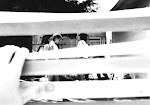Didn't really mean to be gone so long, but it's a sign that I'm working a lot. Two more or less simultaneous projects, a half-written short story, stuff I've sent out. And you know how thinking up blog posts goes...something happens, or you have an interesting thought, yeah, I can work up something about that, but then a day or two passes, and the thought as well, it doesn't seem worth the bother any more.
Blogging has turned out differently than I expected -- but then, what doesn't in life? In the beginning, there was something charged about it, for me, a sense of meeting people, making connections, learning about markets, a frantic sense that we were all about to break through to success -- getting an agent, being published. Then there was the question of what sort of blog yours was going to be. Many of us started out trying to focus on writing -- mechanics, progress, insights. Well, it turns out that not only is it hard to write continually about writing, it's even a little boring. And mendacious. If in July you bragged that you finished 20,000 words, in September you might not want to admit that you ended up scrapping 19,000 of them and starting over. Some people went in the direction of book reviews. I could never do that -- ugh, life's too short, and besides, it turns out that while I can say exactly in exquisite detail why I don't like a book, when I do like a book all I can think of are bland statements like "It was great!" Some wrote about personal things, but in this, as in a diary, a lot tends to get left out and you have to be comfortable with that. And finally, a lot of people just drifted away. When I look at my blog roll, which I've never really bothered to update, I think there are more inactive blogs than not. As for the the success we all anticipated -- well, yes, that has happened.
Livia Blackburne got an agent and has a book coming out. So does Loretta of
Get Back, Loretta. A bunch of others have self-published. Of those who dropped off, well, I still cherish the hope that some of them are writing, just not blogging about it.
This blog has gone all over the place -- sometimes about books, sometimes about writing, sometimes a lot more vague. I don't worry much about it because for me blogging has it's place, and it's way down there, after writing and family and reading. You know what you're good at and what you're not and I've never felt that blogging was the best use of my time.
This doesn't mean that I intend to quit doing it. In fact, I think the decision I made to get into blogging was one of the best of my life. Essentially, all my life, I'd been writing in a cave. When I first started writing, as a child, it wasn't even writing, it was
thinking. I spun out stories in my head, never writing anything down, out of fear. This became a fixed habit, for years, even when I did start writing. Never show it to anyone who might be objective, never ask for criticism. I had no problem sending stuff out, and dealing with the subsequent rejection. (After all, everyone gets rejected, Emily Dickinson, etc, etc.) I had a problem with communicating or sharing with other writers or people who might know something about writing. I was missing a crucial step and never knew it.
Blogging was the beginning of coming out of the cave. However long I go without blogging, I have never regretted the people I've gotten to know through this blog and never ceased to follow what they post. So expect more posts about rain and writing and the occasional passing thought. And if a month or so passes in between them, just figure it means I'm writing.






